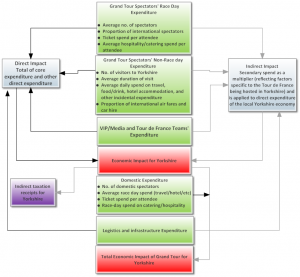 This was the subject of my presentation at the 5th World Communication Forum in Davos, Switzerland and my co-presenter was the dynamic Andrew Denton, Head of Media at Welcome to Yorkshire.
This was the subject of my presentation at the 5th World Communication Forum in Davos, Switzerland and my co-presenter was the dynamic Andrew Denton, Head of Media at Welcome to Yorkshire.
The topic we were asked to address was how global events can stimulate economic development. What you may not realise when you’re reading this blog post is that Yorkshire won the bid to host the first stage of the world’s most famous cycle race, the Tour de France.
The Grand Depart will begin in Leeds on Saturday 5 July 2014 and will be broadcast in 88 countries to millions of viewers around the world, many of whom may not have a clue about where Yorkshire is or indeed how stunning it is as a destination for sport and entertainment.
But all that is about to change and the signs are is that it’s already happening. A special inspirational film that tells the story of this amazing achievement captured the hearts and imagination of delegates at Davos last week.
In his presentation, Andrew Denton said that Yorkshire’s Grand Depart could be worth around £100m to the county’s economy and around 3m spectators could line the route during two days of racing. As a direct result of Yorkshire winning the rights to stage the Grand Depart “we’ve seen the highest year-on-year direct and indirect spend in Yorkshire compared with last year – up 47%, following the announcement last December.”
Research that I undertook for the Department for Business Innovation & Skills last year identified 55 one-off global sports and entertainment including the Tour de France that will generate substantial incremental economic benefits for the local economy as well as the marketing and PR community. This analysis also fed into the Government’s strategy for the future growth of business and professional services in the UK.
The eco-system for generating these substantial economic benefits has sports and entertainment content at its heart.
 Public relations professionals like Andrew Denton and many others have quite literally raised their game and are now focusing their skills and efforts in creating opportunities for inward investment and economic impact, not just column inches or retweets.
Public relations professionals like Andrew Denton and many others have quite literally raised their game and are now focusing their skills and efforts in creating opportunities for inward investment and economic impact, not just column inches or retweets.
If you look behind the headlines, London 2012 generated an estimated £4bn of construction-related GDP by delivering a raft of legacy projects that included new housing and infrastructure related developments in large tracts of East London that had remained derelict for decades.
Winning the rights to stage the ‘Greatest Show on Earth’ also generated £1bn in tourism that flowed into the British economy from visitors who wouldn’t have visited London and the UK in the absence of the Olympic Games.
The calculations that sit behind these headline numbers is a science in its own right.
At a macro level, economic impact assessments (EIA) aim to measure the increased economic activity associated with an event.
For any major sports and entertainment event, such as the Tour de France, the key inputs are the expenditure of participants and spectators, event organisers and governing bodies, and other stakeholders such as suppliers, partners, sponsors as well as sports marketing agencies, advisors, infrastructure, logistics, transportation, technology and media suppliers and marketing services providers.
 The inputs that flow through the local economy have an economic impact on both the regional and national GDP and the following diagram shows the principal components of economic impact that is typical for such an event.
The inputs that flow through the local economy have an economic impact on both the regional and national GDP and the following diagram shows the principal components of economic impact that is typical for such an event.
Core impacts – these primarily comprise of expenditure generated by international spectators attending the Formula-e event and includes tickets and hospitality and entertainment expenditure on race days.
Other direct impacts – these primarily comprise of expenditure generated by all spectators and visitors on accommodation, food/drink, transport and other discretionary expenditure as well as investment in infrastructure.
Indirect and induced impacts – these are ‘multiplier effects’ flowing from direct impacts as these expenditures become recycled through the local Los Angeles economy. The primary components are indirect impacts achieved largely by businesses spending on suppliers and induced impacts, such as recipients reinvesting money within the local economy.
Ardi Kolah is the author of Global opportunities for sports marketing, infrastructure & consultancy services to 2022, published by IMR Publications and has conducted several major EIA for clients around the world.














[…] I was speaking at the World Communication Forum in Davos earlier this year, I got to know Paul Holmes and I felt that he was one person in our […]